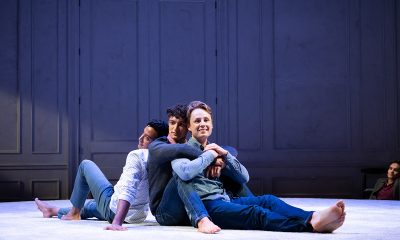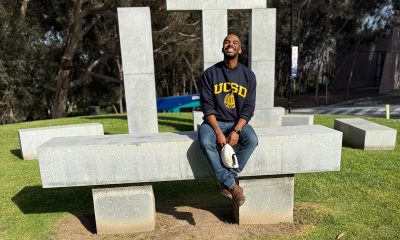Arts & Entertainment
Romance and religion
Gay-themed play explores prickly subjects with humor
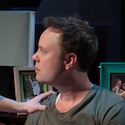
‘Next Fall’
Round House Theatre
Through Feb. 26
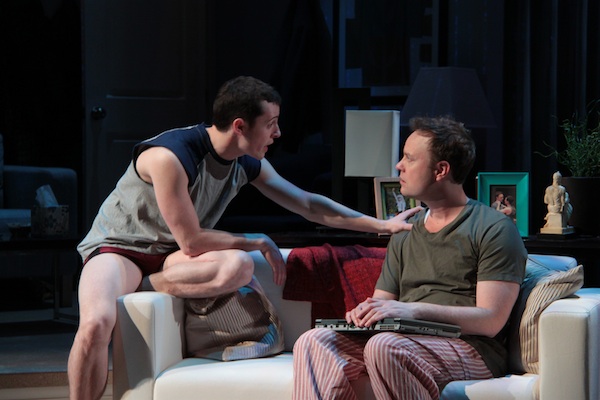
Chris Dinolfo as Luke, left, and Tom Story as Adam in ‘Next Fall’ at Round House Theatre. (Photo by Danisha Crosby; courtesy Round House)
Sex and spirituality — or the lack thereof — intersect in thought-provoking ways in the flawed-but-worthy play ‘Next Fall,” a 2009 piece that’s enjoying a post-Broadway local run at Round House Theatre in Bethesda, Md.
Luke (Chris Dinolfo) and Adam (Tom Story) meet when the former gives the latter the Heimlich maneuver to ease a panic attack at a party. He later admits it was just an excuse to get his arms around Adam, who’s older (he reluctantly admits to 40), a neurotic hypochondriac drifting through life. Luke is young and cute, a promising actor whose career is about to take off. Opposites attract, of course, and a one-night stand turns into a long-term committed relationship.
The premise may sound like a Hollywood screwball comedy, but playwright Geoffrey Nauffts (who’s played Adam in previous productions) soon dives into more serious territory. There’s another serious difference between the two men — Luke’s a devout fundamentalist Christian and Adam’s a committed agnostic. And unlike a typical screwball comedy, Nauffts’ fascinating script focuses not so much on what brings the characters together in the first place, but on what keeps them together over the years.
The play opens in a hospital. Luke has been struck by a taxi and his anxious family and friends keep vigil in the hospital waiting room. They have been summoned by the tightly wound Brandon (Alexander Strain in a somewhat underwritten role), Luke’s estranged friend who’s a thriving real estate mogul who is also struggling with Christianity and homosexuality. Adam’s friend Holly (Dawn Ursula) runs the candle shop where both Luke and Adam work at various times and who searches for meaning (and men) in a variety of New Age activities. Luke’s divorced parents have arrived from Tallahassee, Fla. Arlene (Kathryn Kelley) is fighting her own demons and the ruggedly pious Butch (Kevin Cutts) willfully ignores the signs that his son is gay. As the present-day medical drama unfolds, flashbacks move fluidly through time, tracing how the two men meet, move in together and negotiate the many compromises necessary in any relationship.
Unfortunately, the heavy-handed production at Round House Theatre frequently tramples on Nauffts’ finely wrought structure and delicately crafted language. Where the scenes should flow seamlessly together, director Mark Ramont and his design team stop the action cold after every scene with slow fades, overwrought music and awkward set changes. These painful transitions stop the play in its tracks, leaving the actors to struggle to regain their momentum when the action resumes.
This fumbling treatment also extends to some of the acting. Kelley struggles unsuccessfully with the role of Luke’s troubled hardscrabble mother Arlene who abandoned Luke when he was a toddler. She never finds her way through the complex vocal and emotional shadings of the character, missing the potent combination of desperation and guilt and anger that fuel the character and fighting against the complex rhythms of the dialogue.
Luckily, Story and Dinolfo bring passion and electricity to the central characters. The openly gay actors display an easy physicality in their onstage relationship. We see the deep physical and emotional bonds that pull them together and we also see the tense spiritual doubts that push them apart. Luke desperately and sincerely wishes that Adam could find faith so they can spend eternity together. Adam hates the fact that Luke prays for forgiveness after they have sex and refuses to come out to his parents. Story and Dinolfo make these tensions palpable and draw us into their compelling story.
They also expertly use Nauffts’ rich language to full effect. For all its serious themes and moving drama, “Next Fall” is often funny. Among other things, Nauffts explores the intriguing way humor is used in different situations: as a strategic defense, as a coping mechanism, as a weapon, as seduction, as social lubricant, as a world view. He also depicts spirituality in a sensitive and robust manner, embracing the many ways his characters find their way through an uncertain religious and ethical universe. All of them are on serious spiritual quests, whether they acknowledge it or not, and these issues come naturally to the fore as Luke battles for his life. Nauffts also captures the ebb and flow of the various long-term relationships with nuance and naturalness. It’s a rare play that tells us everything we need to know about the characters yet leaves us wanting more.
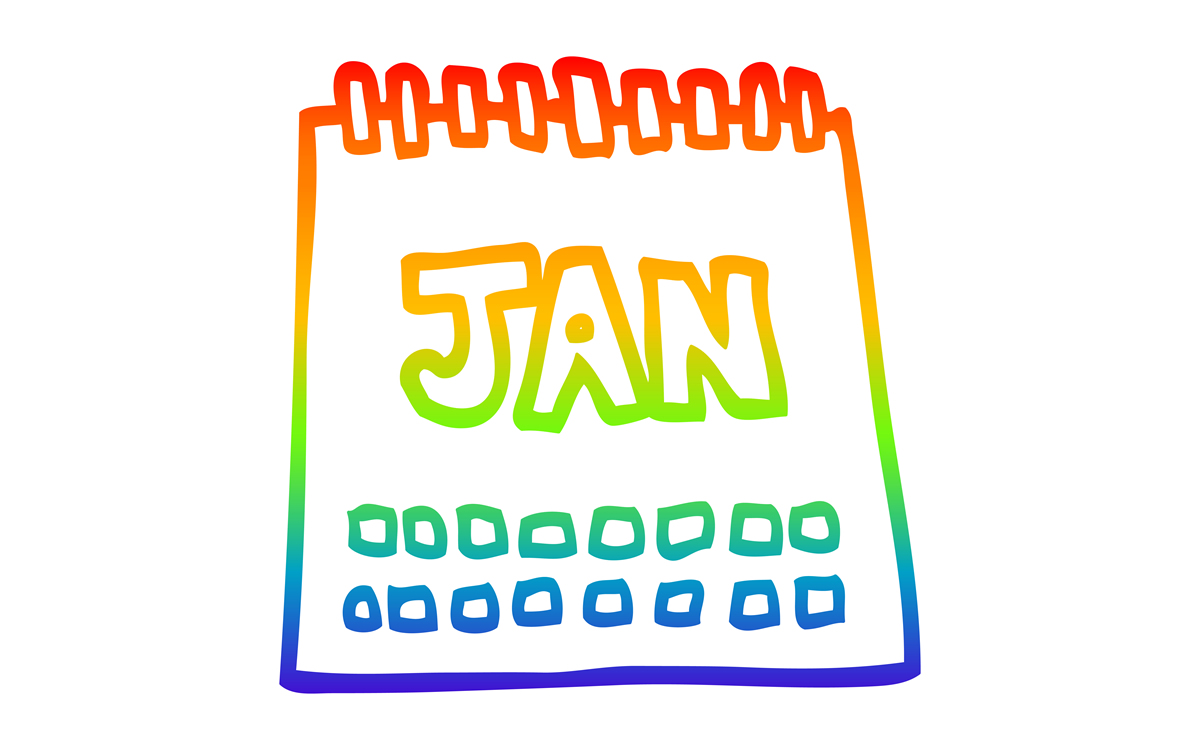
Friday, January 9
Women in Their Twenties and Thirties will be at 8 p.m. on Zoom. This is a social discussion group for queer women in the Washington, D.C. area. For more details, visit Facebook.
“Backbone Comedy” will be at 8 p.m. at As You Are. Backbone Comedy is a queer-run fundraiser comedy show at As You Are Bar DC, where comics stand up for a cause. Each show, a percentage of proceeds go to a local organization – Free Minds DC, a reentry organization for individuals impacted by incarceration. Tickets cost $19.98 and are available on Eventbrite.
Saturday, January 10
Go Gay DC will host “LGBTQ+ Community Brunch” at 11 a.m. at Freddie’s Beach Bar & Restaurant. This fun weekly event brings the DMV area LGBTQ+ community, including allies, together for delicious food and conversation. Attendance is free and more details are available on Eventbrite.
Monday, January 12
“Center Aging: Monday Coffee Klatch” will be at 10 a.m. on Zoom. This is a social hour for older LGBTQ+ adults. Guests are encouraged to bring a beverage of choice. For more information, contact Adam ([email protected]).
Genderqueer DC will be at 7 p.m. on Zoom. This is a support group for people who identify outside of the gender binary, whether you’re bigender, agender, genderfluid, or just know that you’re not 100% cis. For more details, visit genderqueerdc.org or Facebook.
Tuesday, January 13
Coming Out Discussion Group will be at 7 p.m. on Zoom. This is a safe space to share experiences about coming out and discuss topics as it relates to doing so — by sharing struggles and victories the group allows those newly coming out and who have been out for a while to learn from others. For more details, visit the group’s Facebook.
Trans Discussion Group will be at 7 p.m. on Zoom. This group is intended to provide an emotionally and physically safe space for trans people and those who may be questioning their gender identity/expression to join together in community and learn from one another. For more details, email [email protected].
Wednesday, January 14
Job Club will be at 6 p.m. on Zoom upon request. This is a weekly job support program to help job entrants and seekers, including the long-term unemployed, improve self-confidence, motivation, resilience and productivity for effective job searches and networking — allowing participants to move away from being merely “applicants” toward being “candidates.” For more information, email [email protected] or visit thedccenter.org/careers.
The DC Center for the LGBT Community will partner with House of Ruth to host “Art & Conversation” at 3 p.m. at 1827 Wiltberger St., N.W. This free workshop will involve two hours of art making, conversation, and community. Guests will explore elements of healthy relationships with a community-centered art activity. This workshop involves paint, so please dress accordingly. All materials will be provided. For more details, email [email protected].
Thursday, January 15
The DC Center’s Fresh Produce Program will be held all day at the DC Center for the LGBT Community. People will be informed on Wednesday at 5 p.m. if they are picked to receive a produce box. No proof of residency or income is required. For more information, email [email protected] or call 202-682-2245.
Virtual Yoga Class will be at 7 p.m. on Zoom. This free weekly class is a combination of yoga, breathwork and meditation that allows LGBTQ+ community members to continue their healing journey with somatic and mindfulness practices. For more details, visit the DC Center’s website.
Movies
‘Hedda’ brings queer visibility to Golden Globes
Tessa Thompson up for Best Actress for new take on Ibsen classic

The 83rd annual Golden Globes awards are set for Sunday (CBS, 8 p.m. EST). One of the many bright spots this awards season is “Hedda,” a unique LGBTQ version of the classic Henrik Ibsen story, “Hedda Gabler,” starring powerhouses Nina Hoss, Tessa Thompson and Imogen Poots. A modern reinterpretation of a timeless story, the film and its cast have already received several nominations this awards season, including a Globes nod for Best Actress for Thompson.
Writer/director Nia DaCosta was fascinated by Ibsen’s play and the enigmatic character of the deeply complex Hedda, who in the original, is stuck in a marriage she doesn’t want, and still is drawn to her former lover, Eilert.
But in DaCosta’s adaptation, there’s a fundamental difference: Eilert is being played by Hoss, and is now named Eileen.
“That name change adds this element of queerness to the story as well,” said DaCosta at a recent Golden Globes press event. “And although some people read the original play as Hedda being queer, which I find interesting, which I didn’t necessarily…it was a side effect in my movie that everyone was queer once I changed Eilert to a woman.”
She added: “But it still, for me, stayed true to the original because I was staying true to all the themes and the feelings and the sort of muckiness that I love so much about the original work.”
Thompson, who is bisexual, enjoyed playing this new version of Hedda, noting that the queer love storyline gave the film “a whole lot of knockoff effects.”
“But I think more than that, I think fundamentally something that it does is give Hedda a real foil. Another woman who’s in the world who’s making very different choices. And I think this is a film that wants to explore that piece more than Ibsen’s.”
DaCosta making it a queer story “made that kind of jump off the page and get under my skin in a way that felt really immediate,” Thompson acknowledged.
“It wants to explore sort of pathways to personhood and gaining sort of agency over one’s life. In the original piece, you have Hedda saying, ‘for once, I want to be in control of a man’s destiny,’” said Thompson.
“And I think in our piece, you see a woman struggling with trying to be in control of her own. And I thought that sort of mind, what is in the original material, but made it just, for me, make sense as a modern woman now.”
It is because of Hedda’s jealousy and envy of Eileen and her new girlfriend (Poots) that we see the character make impulsive moves.
“I think to a modern sensibility, the idea of a woman being quite jealous of another woman and acting out on that is really something that there’s not a lot of patience or grace for that in the world that we live in now,” said Thompson.
“Which I appreciate. But I do think there is something really generative. What I discovered with playing Hedda is, if it’s not left unchecked, there’s something very generative about feelings like envy and jealousy, because they point us in the direction of self. They help us understand the kind of lives that we want to live.”
Hoss actually played Hedda on stage in Berlin for several years previously.
“When I read the script, I was so surprised and mesmerized by what this decision did that there’s an Eileen instead of an Ejlert Lovborg,” said Hoss. “I was so drawn to this woman immediately.”
The deep love that is still there between Hedda and Eileen was immediately evident, as soon as the characters meet onscreen.
“If she is able to have this emotion with Eileen’s eyes, I think she isn’t yet because she doesn’t want to be vulnerable,” said Hoss. “So she doesn’t allow herself to feel that because then she could get hurt. And that’s something Eileen never got through to. So that’s the deep sadness within Eileen that she couldn’t make her feel the love, but at least these two when they meet, you feel like, ‘Oh my God, it’s not yet done with those two.’’’
Onscreen and offscreen, Thompson and Hoss loved working with each other.
“She did such great, strong choices…I looked at her transforming, which was somewhat mesmerizing, and she was really dangerous,” Hoss enthused. “It’s like when she was Hedda, I was a little bit like, but on the other hand, of course, fascinated. And that’s the thing that these humans have that are slightly dangerous. They’re also very fascinating.”
Hoss said that’s what drew Eileen to Hedda.
“I think both women want to change each other, but actually how they are is what attracts them to each other. And they’re very complimentary in that sense. So they would make up a great couple, I would believe. But the way they are right now, they’re just not good for each other. So in a way, that’s what we were talking about. I think we thought, ‘well, the background story must have been something like a chaotic, wonderful, just exploring for the first time, being in love, being out of society, doing something slightly dangerous, hidden, and then not so hidden because they would enter the Bohemian world where it was kind of okay to be queer and to celebrate yourself and to explore it.’”
But up to a certain point, because Eileen started working and was really after, ‘This is what I want to do. I want to publish, I want to become someone in the academic world,’” noted Hoss.
Poots has had her hands full playing Eileen’s love interest as she also starred in the complicated drama, “The Chronology of Water” (based on the memoir by Lydia Yuknavitch and directed by queer actress Kristen Stewart).
“Because the character in ‘Hedda’ is the only person in that triptych of women who’s acting on her impulses, despite the fact she’s incredibly, seemingly fragile, she’s the only one who has the ability to move through cowardice,” Poots acknowledged. “And that’s an interesting thing.”
Arts & Entertainment
2026 Most Eligible LGBTQ Singles nominations
We are looking for the most eligible LGBTQ singles in the Washington, D.C. region.

Are you or a friend looking to find a little love in 2026? We are looking for the most eligible LGBTQ singles in the Washington, D.C. region. Nominate you or your friends until January 23rd using the form below or by clicking HERE.
Our most eligible singles will be announced online in February. View our 2025 singles HERE.
-

 National3 days ago
National3 days agoWhat to watch for in 2026: midterms, Supreme Court, and more
-

 District of Columbia4 days ago
District of Columbia4 days agoTwo pioneering gay journalists to speak at Thursday event
-

 a&e features4 days ago
a&e features4 days agoQueer highlights of the 2026 Critics Choice Awards: Aunt Gladys, that ‘Heated Rivalry’ shoutout and more
-

 Colombia4 days ago
Colombia4 days agoBlade travels to Colombia after U.S. forces seize Maduro in Venezuela



